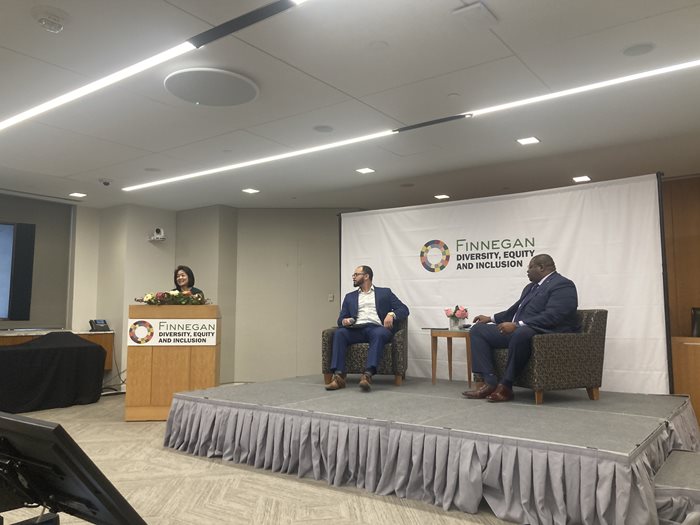Issues & Trends
In Celebrating Black History Month, Finnegan Connects Past to Present to Address Disparities
February 23, 2024

From left to right: Finnegan partner Esther Lim, Finnegan associate Alexander Newkirk, and Damon Hewitt, president and executive director of the Lawyers’ Committee for Civil Rights Under Law
At a Black History Month program at Finnegan, Henderson, Farabow, Garrett & Dunner, LLP on February 6, attendees were reminded that prior to the passage of the 14th Amendment, Black inventors were prevented from obtaining protection for their innovations.
“Black people, enslaved people, were not considered citizens [of] the United States,” said Finnegan associate Alexander (Zan) Newkirk. “When they applied for a patent, they had to take the patent oath. This oath require[d] that they certify that they are the true inventor of the thing they want to patent, and to certify that they are a U.S. citizen.”
Newkirk continued with examples of how enslaved people, or those holding them in slavery, were denied patents for their inventions because of this requirement. Although the issue was ostensibly addressed by the 14th Amendment’s extension of rights and citizenship to Black Americans, inequalities continue today.
“There’s still a big disparity between the patents issued to Black inventors and [to] inventors as a whole,” Newkirk said. “It’s estimated that African Americans obtained just 6 patents per million people, compared to 235 per million for all U.S. inventors. So, to help bridge that gap we have to inspire and we have to educate inventors, future inventors, our youth, the lawyers, and law firms.”
The conversation hosted by Finnegan also featured Damon T. Hewitt, president and executive director of the Lawyers’ Committee for Civil Rights Under Law, whose work focuses on ongoing racial disparities. Before joining the Lawyers’ Committee, Hewitt was the inaugural executive director of the Executives’ Alliance for Boys and Men of Color, served as an attorney at the NAACP Legal Defense and Educational Fund for more than a decade, and co-authored the book The School-to-Prison Pipeline: Structuring Legal Reform.
Hewitt said his interest in civil rights and education policy stemmed from his own observations of disparities in opportunities available to young Black people. During his junior year of high school in the early 1990s, Hewitt was involved as faculty in a summer learning program where, although he shared many of the circumstances and experiences of the students in the program, he was often viewed as apart from them, as an exceptional case.
“The notion of me [as] an anomaly … I wanted to make that different, in the optics and in reality, so that’s what I’ve dedicated myself to doing,” he said.
Efforts to increase diversity, equity, and inclusion are important for their potential future impacts, Hewitt said. As an attorney at the NAACP Legal Defense Fund, he was lead counsel in a lawsuit alleging discrimination in the New York City school system. “We could not fathom how [you] could … have an incoming class of hundreds of students in a huge high school, the most elite high school in the city, yet you typically had the number of Black students in the single digits,” he said. “Mind you, New York City has [more than] one million students overall.”
“There should be a cognitive dissonance that goes off in your mind,” Hewitt added. “The point is that there is this assumption of inferiority, especially among Black people. This assumption leads us to expect and even accept those kinds of results, as if it’s just normal and naturally occurring, but it is not. It is structural racism at its worst. It’s at its worst not only because of the disparity, but because we are conned into believing that that is the natural order of things.”
For businesses, Hewitt said that planning and intentionality are key to achieving a culture of diversity, equity, and inclusion. “You can’t just say, well, we’re good people, so that’s enough,” he said. “Good people without a plan? Would you walk into patent litigation without a plan because you figure you have good people and they work hard? No. You have to have a plan to protect their intellectual property rights. So, I think you also have to have a plan, assets, and resources that are dedicated to building and maintaining a culture.”
Hewitt’s current work at the Lawyers’ Committee frequently involves voting rights. In addition to bringing litigation relating to voter suppression, his organization administers the Election Protection coalition, the centerpiece of which is a voter protection hotline (866-OUR-VOTE) staffed by attorney volunteers.
The hotline provides information about voting rights and collects reports of voter intimidation, disinformation, and other emerging issues. During the last election cycle, approximately 14,000 attorney volunteers responded to more than a quarter million inquiries through the hotline.
The Election Protection coalition has helped surface issues that sometimes result in litigation. A 2022 lawsuit over voter intimidation resulted in the removal of a Texas poll worker who egregiously intimidated Black voters. Separately, a 2020 tip uncovered a voter disinformation campaign involving a robocaller that suggested police and other authorities would use information gathered from mail-in ballots to collect on debts, execute arrests, and force mandatory vaccinations. As a result of the litigation, those responsible for the calls were enjoined from the activity and were fined $5 million by the Federal Communications Commission.
“Orchestrated disinformation is something we often learn about through the [hotline], and it leads to litigation,” Hewitt said, encouraging attorneys to help make an impact. “You can get involved. You can volunteer to participate in the voter protection helpline and help voters in real time and maybe even fuel litigation work.”


